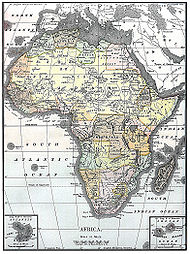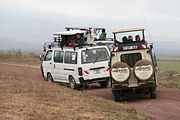
Safari
Background to the schools Wikipedia
This selection is made for schools by a children's charity read more. Sponsor a child to make a real difference.
| Look up safari in Wiktionary, the free dictionary. |
A safari (pronounced /səˈfɑri/) is an overland journey, usually a trip by tourists to Africa, traditionally for a big-game hunt; today the term often refers to a trip taken not for the purposes of hunting, but to observe and photograph animals and other wildlife. There is a certain theme or style associated with the word, which includes khaki clothing, belted bush jackets, pith helmets or slouch hats, and animal skins—like leopard's skin.
Entering the English language in the late 19th century, the word safari means "long journey" in Swahili. Originally from the Arabic سفرة (safar) meaning a journey The verb for "to travel" in Swahili is "kusafiri", the noun for the journey is "safari". These words are used for any type of journey, e.g. by bus from Nairobi to Mombasa. The person generally attributed to having used the word in English is Sir Richard Francis Burton, the famous explorer.
The Regimental March of the King's African Rifles was 'Funga Safari', literally 'Halt the March', or, in other words, stop work for the day.
Funga safari, funga safari. Funga safari, funga safari. Hamari ya nani? Hamari ya nani? Hamari ya Bwana Kapteni, Hamari ya keyaa.
Which is, in English:
Halt the march. Halt the march. On whose orders? On whose orders? On the order of the boss captain, On the order of the KAR.
On Kenya's independence from Britain, Funga Safari was retained as the Regimental March of the Kenya Rifles, successor to the K.A.R.
As a cinema genre
The safari provided countless hours of cinema entertainment in sound films from Trader Horn (1931) onwards. The safari was used in many adventure films such as the Tarzan, Jungle Jim, and Bomba the Jungle Boy film series up to The Naked Prey (1966) where Cornel Wilde, a white hunter, becomes game himself. Also, safaris and the safari genre films were parodied in the Bob Hope comedies Road to Zanzibar and Call Me Bwana. An instant 15-minute helicopter safari was shown in Africa Addio where clients are armed, flown from their hotel and landed in front of an unlucky and baffled elephant. Out of Africa has Karen Blixen and Denys Finch Hatton travelling with Denys refusing to abandon home comforts using fine china and crystal and listening to Mozart recordings over the gramophone while on safari.


